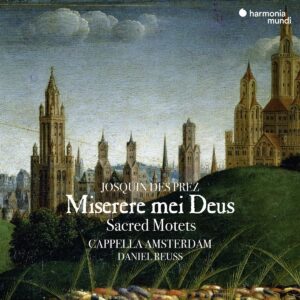You wouldn’t expect a disc of Funeral Motets & Deplorations to be as uplifting, looking at this release from Cappella Amsterdam with Josquin Des Prez’s music of that description. But uplifting it is. Not, obviously, in a happy, care-free way like watching a matinee of “Mamma Mia! Here We Go Again” at the Arlington Drafthouse with your girlfriends and a pitcher of Margaritas: “Uplifting” more in the sense that, rather than evoking sadness, the music evokes tranquility. Perhaps some of the difference in dealing with death in that time and place still spills over into our very different times? The accepting calm with which death was treated; the matter-of-factness of mourning; the optimism for a better life in the beyond that contrasted starkly with the rough going that even the luckiest humanoids had in the late Middle Ages and at the dawn of the Renaissance? (Josquin was born three years before the fall of Constantinople!)
Whatever it is, it is communicated with the utmost clarity by the singers of Cappella Amsterdam, caught in Amsterdam’s Waalse Kerk which offers moderate reverberation that makes the music glow but never sound “wet”. The poster boy of the “Franco-Flemish School” of liturgical music, Josquin (~1450-1521), who counted Martin Luther among his fans (the latter famously called the composer “the master of notes. They had to do as Josquin bid them. Other composers had to do as the notes bid them.”), twines his melodies around plainchants to moving effect. With perfect balance among the lines he mourns (praises) his senior colleague Johannes in the disc’s opening work, into which Josquin implanted a melody of Ockeghem’s. As a fitting closing measure Daniel Reuss and his 13 singers (four-to-a-part in the S-T-B setup, plus one alto) add Musæ Jovis, a piece that Nicolas Gombert wrote in turn to mourn Josquin. And just like Josquin quoted Ockeghem, Gombert now quotes a melody by Josquin, except a symbolic (for death) semi-tone lower. These are details one need not pick up on to be moved, such is the quality of execution.
































